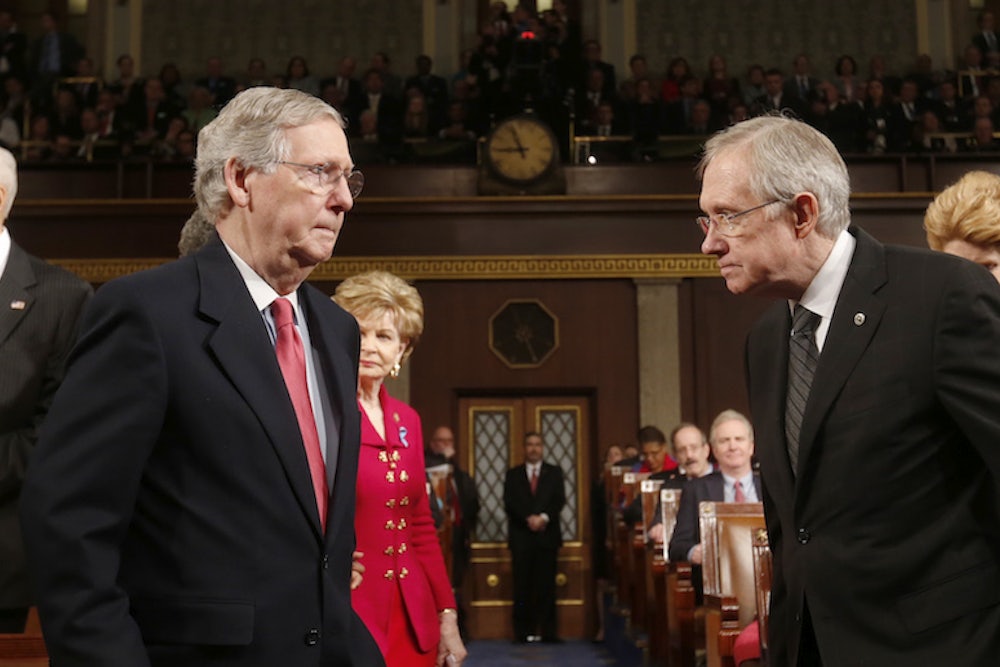The most interesting thing about Senator Mark Pryor’s decision to tout his support for the Affordable Care Act in a well-financed, statewide television ad isn’t that he stands apart from other embattled Democrats this election cycle. It’s that Republicans scrambled to spin the story, insisting to reporters that Pryor couldn’t possibly be running on Obamacare if he won’t refer to the law by name.
This was poorly disguised Calvinball, a standard that Republicans invented for the special case of the ACA. Literally no other members of Congress are expected to refer to the laws they’ve helped pass by name or nickname. Republicans in the aughts weren’t expected to refer to the "Economic Growth and Tax Relief Reconciliation Act," or "EGTRRA," or “the Bush tax cuts,” or "the Bush tax cuts for the rich," no matter how unpopular the moniker became. They ran on having cut taxes, and wanting to renew those tax cuts. And sure enough when President Obama set about trying to let “the Bush tax cuts” expire, he conveniently omitted the popular ones. Which is to say, the vast majority of them. He made those permanent.
Nevertheless, several reporters fell into line. And good for the ref workers. Score one for them.
But if Obamacare is a huge liability for Democrats, why are conservatives and GOP operatives desperate to control the narrative surrounding Pryor’s decision to run on the law? If your opponent’s stepping on rakes, why not just stand back and let him?
The answer is that with respect to both Obamacare and other issues Republicans must rely on diversions from policy and outcomes when expressing their substantive and strategic views. We’ve reached a point in the fight over Obamacare where the best thing Republicans have on their side is the law’s unpopular brand. Particularly in states like Arkansas, where President Obama is widely loathed but his signature law has cut the uninsurance rate nearly in half. It’s deeply silly to argue that Pryor isn’t running on Obamacare unless he refers to it using one of two unpopular slogans. But that’s the argument.
Instead, Pryor says, "I helped pass a law that prevents insurance companies from canceling your policy if you get sick or deny [sic] coverage based on pre-existing conditions.” Maybe he shouldn’t have said anything about “a law” at all, but that’s a niggling, semantic critique. That Republicans working to defeat Pryor are asking reporters to squeeze the word “Obamacare” into this sentence is an admission that they’ve lost the policy fight. They criticize Pryor for eschewing the label, because the label’s just about the only thing they’re comfortable assailing. In this way, they resemble Democrats six and eight years ago, running against the Bush tax cuts (for the rich), knowing that they had no intention of letting anything but the most regressive of those tax cuts expire.
In that sense, the GOP’s obsession with the moniker, and only the moniker, is excellent news for Obamacare’s political durability. But only if the people who cover politics are clear about the implications of the GOP’s rhetoric. Unlike Democrats, who were generally clear about the fact that they planned to make most of the Bush tax cuts permanent, Pryor’s opponent, Representative Tom Cotton, acknowledges that the pre-Obamacare status quo, in which insurers denied coverage to people with pre-existing health conditions, was “broken,” but nevertheless maintains that his goal is to repeal the law that makes that practice illegal.
Cotton repeated that mantra just this week, on the trail with Mitt Romney, who, in an amusing twist, tried to save Cotton from himself. "Tom Cotton is going to make sure that we change Obamacare, making sure that people can keep insurance and those that have pre-existing conditions can have coverage,” Romney said, “but he doesn’t want to see the federal government telling people in Arkansas what kind of insurance they have to have or making it more expensive." Those are remarkably accommodating priorities. They’re just not ones Cotton is prepared to espouse just yet.
In this way, the politics of Obamacare in Arkansas mirror the politics of legislative brinksmanship in Kentucky. Just two days ago, Mitch McConnell, the embattled Senate minority leader who hopes to become majority leader next year, vowed to lard up appropriations bills with partisan policy riders and allow the president choose between a veto, precipitating a government shutdown, and a bitter pill. A classic take it or leave it proposition.
McConnell said it would be up to the president to decide whether to veto spending bills that would keep the government open.
Obama “needs to be challenged, and the best way to do that is through the funding process,” McConnell said. “He would have to make a decision on a given bill, whether there’s more in it that he likes than dislikes.”
It wouldn't be much of a challenge to Obama if McConnell plans to cave the moment the president whips out his veto pen. So the threat is pretty clear. Nevertheless, McConnell’s campaign wasn’t pleased by the ensuing deluge of stories about how a GOP majority would embrace high-stakes confrontations and potentially shut down the government again. And in a very narrow sense they have a point—McConnell never said he’d shut down the government. Political scientist Jonathan Bernstein, no McConnell partisan, was among those who defended McConnell on this score.
But much like Cotton can't credibly claim to support protections for people with pre-existing medical conditions when his plan is to repeal Obamacare, McConnell can't sidestep the implications of his publicly declared strategy. He can’t say “when we’re in power, we’re going to put two and two together,” and then get angry when the headlines say, “McConnell promises four.”
That won't stop him from trying to, though. And to an unappreciated extent, the broader Republican strategy heading into November is to speak in abstractions, and take cover behind what’s left unsaid.
